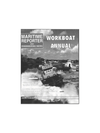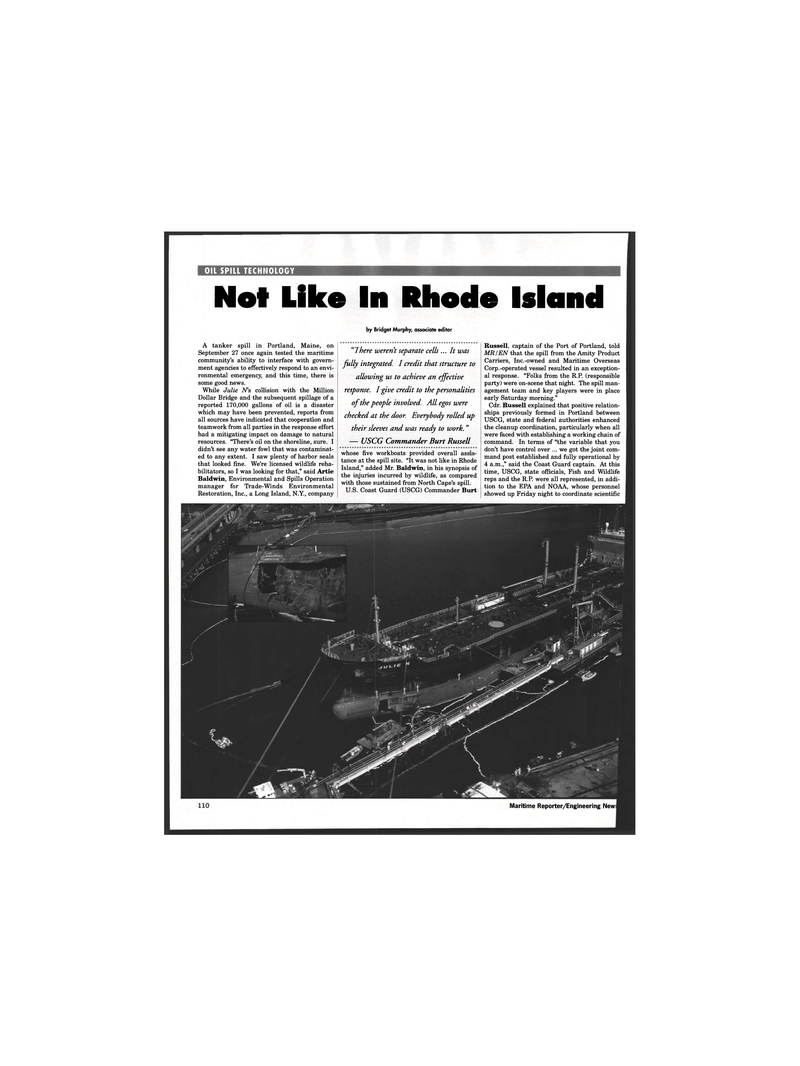
Page 108: of Maritime Reporter Magazine (November 1996)
Read this page in Pdf, Flash or Html5 edition of November 1996 Maritime Reporter Magazine
OIL SPILL TECHNOLOGY
Not Like In Rhode Island by Bridget Murphy, associate editor
A tanker spill in Portland, Maine, on
September 27 once again tested the maritime community's ability to interface with govern- ment agencies to effectively respond to an envi- ronmental emergency, and this time, there is some good news.
While Julie iVs collision with the Million
Dollar Bridge and the subsequent spillage of a reported 170,000 gallons of oil is a disaster which may have been prevented, reports from all sources have indicated that cooperation and teamwork from all parties in the response effort had a mitigating impact on damage to natural resources. "There's oil on the shoreline, sure. I didn't see any water fowl that was contaminat- ed to any extent. I saw plenty of harbor seals that looked fine. We're licensed wildlife reha- bilitators, so I was looking for that," said Artie
Baldwin, Environmental and Spills Operation manager for Trade-Winds Environmental
Restoration, Inc., a Long Island, N.Y., company "There weren't separate cells ...It was fully integrated. I credit that structure to allowing us to achieve an effective response. I give credit to the personalities of the people involved. All egos were checked at the door. Everybody rolled up their sleeves and was ready to work. " — USCG Commander Burt Russell whose five workboats provided overall assis- tance at the spill site. "It was not like in Rhode
Island," added Mr. Baldwin, in his synopsis of the injuries incurred by wildlife, as compared with those sustained from North Cape's spill.
U.S. Coast Guard (USCG) Commander Burt
Russell, captain of the Port of Portland, told
MR I EN that the spill from the Amity Product
Carriers, Inc.-owned and Maritime Overseas
Corp.-operated vessel resulted in an exception- al response. "Folks from the R.P. (responsible party) were on-scene that night. The spill man- agement team and key players were in place early Saturday morning."
Cdr. Russell explained that positive relation- ships previously formed in Portland between
USCG, state and federal authorities enhanced the cleanup coordination, particularly when all were faced with establishing a working chain of command. In terms of "the variable that you don't have control over ... we got the joint com- mand post established and fully operational by 4 a.m.," said the Coast Guard captain. At this time, USCG, state officials, Fish and Wildlife reps and the R.P. were all represented, in addi- tion to the EPA and NOAA, whose personnel showed up Friday night to coordinate scientific
Maritime Reporter/Engineering New

 107
107

 109
109
